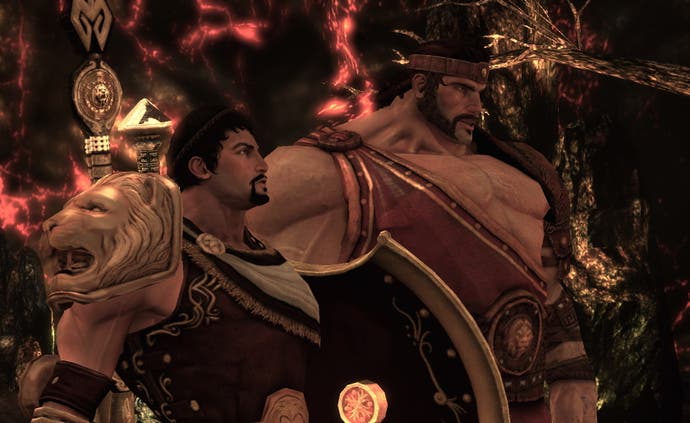Rise of the Argonauts
Golden fleece?
"Till death do us part." Aw. Rarely, though, has the aforementioned parting arrived as quickly as it does in the marriage of King Jason to his Queen, Alceme. Her hand in his, the lovers lean in for a kiss that will mark the start their life together. But the consummation is over before it begins: Alceme sinks to the ground, all vacant eyes and bluing lips, an arrow shaft quivering from her bosom. Jason spins on his heel to see a group of Ionian archers fleeing across the palace ramparts, then turns back to see his wife dead and his heart broken.
It's far from a subtle Greek tragic opening, but Liquid Entertainment's take on the mythical premise is certainly a swift and efficient one. In less than 30 seconds we've established a hero, a villain, a motive and a revenge theme that will draw nations and heroes to arms. Still, as you sprint towards an enemy soldier, dodging his flaming arrows before thrusting your spear through his neck in a single, swift and fluid motion, one thing is clear: Euripides, this is not.
The Jason of this action-RPG, much like the character depicted in the 1960s Don Chaffey film of the myth, is an alpha male pin-up with an improbably large shield and a six-pack that ripples all the way up to his neck. The first twenty minutes of the game take the form of a pursuit, where you steamroller through enemy ranks, slicing torsos from limbs with enraged ease, switching between your sword, spear and mace with a single tap of a button in a big, dumb, gruesome action sequence.
The mechanics are straightforward: you have a light attack, a heavy attack, and a shield barge that can be used to shove enemies away from you. You can combo attacks together, switch weapons mid-string, and apply modifiers to your attacks for special moves. The range of offensive interactions is adequate to start with, if not generous, and while the combat is fast and fluid and the gore designed to shock, there's really nothing here we haven't seen before. So far, so Conan.

When you finally reach Alceme's killer, and either pause to let him utter his final words or break his face and let the life drain through the wound (your choice), there's a clue that this is an action-RPG with a slight difference. Text, subtle text, flashes up on screen: 'You drove the Ionians from your palace in Ioclus', and then 'You avenged Alceme's death by killing Ephoros'. The proclamation of these deeds is more than mere narrative underscoring. In Rise of the Argonauts, deeds are the currency by which you grow stronger, not only in terms of the plot but also in terms of your power as an interactive entity.
It's clear that in making Rise of the Argonauts the Liquid Entertainment team decided to tear up the Diablo/Dungeons & Dragons rule book in search of a third way. Every feat you achieve in the game, every fetch mission completed, every 'convey this message to my dying parents' errand, every titan toppled, diplomacy struck and moment of justice meted is rewarded with a deed point (our term). This deed can then be attributed to one of the four Greek gods who preside over the game: Ares, Hermes, Athena and Apollo.


